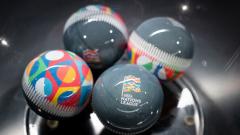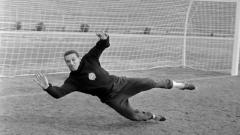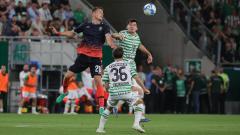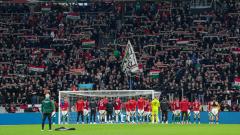May Day: Hungarian Cup final day in the 1970s
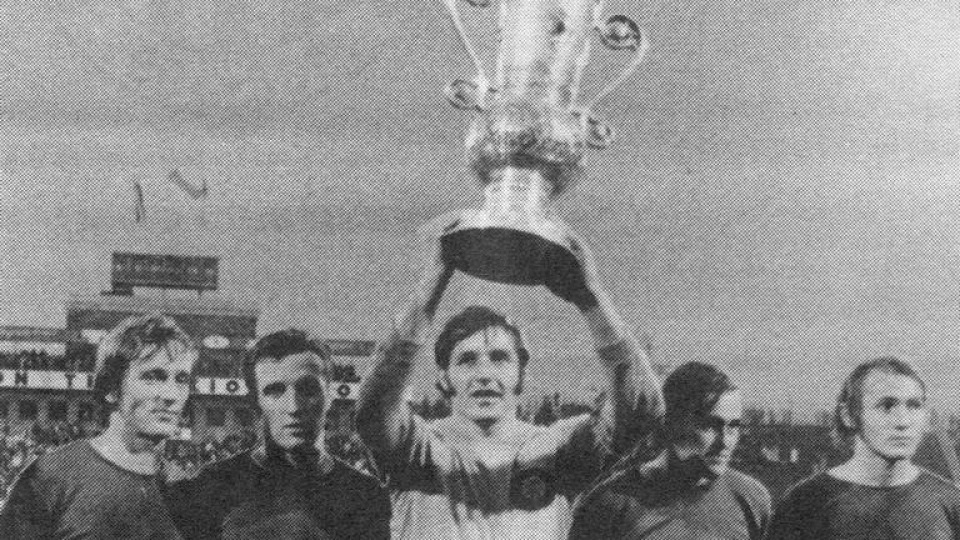
The Hungarian Cup has been contested for much of the last 110 years and for a short period in the 1970s, the winner was always decided on 1st May. On their anniversaries, we look back at those four hotly-contested finals.
Photo: Ferencváros goalkeeper István Géczi raises the Hungarian Cup on May Day 1974 (Népsport).
Ferencváros are the Hungarian Cup's most successful club, having held the famous trophy aloft 23 times, and two of those occasions came in the early- to mid-1970s, when the competition's final was held on May Day, as usual in the country's national stadium, the iconic Népstadion. The Hungarian football calendar changed drastically in 1971 when the season switched from a spring-to- autumn format to one in which it would start in late summer and conclude in late spring, as per most other UEFA-affiliated nations in order to allow European
competitions to take place more efficiently.
That meant there was no room for the 1971 edition of the Hungarian Cup but the tournament returned with renewed vigour in 1972 and was claimed by Ferencváros for a record 11th time after they defeated 'Magyar Kupa' final debutants Tatabánya 2-1.
The following year saw a new date on which the Hungary's national cup winners would be decided; May Day. A total of 1066 clubs from around the country started the season with dreams of Cup success but after holders Ferencváros crashed out in the first round to second-tier Dunaújváros Kohász and the dominant league team of the era Újpest Dózsa were surprised away at Videoton, it came down to two of the other capital-city giants, Honvéd and Vasas SC, to decide who would keep the trophy in Budapest.
Újpest had only won their first Hungarian Cup fours years earlier in 1969 but retained their title the following year, while Vasas had last tasted domestic knockout tournament success 19 years previous in 1955. A goal-laden final in front of 10,000 spectators saw Vasas striker Béla Várady score the opening goal from ten metres in the seventh minute, only for József Pál equalise with a header from a corner just before the quarter-hour mark. Várady struck again five minutes before the half-time break but his Honvéd counterpart Mihály Kozma
levelled matters with a ten-metre finish into the bottom-left corner of the Vasas goal in the 55th minute.
Lajos Baróti's Vasas took the lead again when Ferenc Kovács took advantage of Honvéd's defenders expecting him to cross the ball in the 77th minute and instead surged into the penalty area from the left before driving the ball superbly inside the near post to put his side 3-2 up.
Yet again though, Honvéd restored parity when Kozma's trick gave him the space to fire the ball into the right side of Vasas goalkeeper Gyula Tamás' goal from ten metres. The scores were locked at 3-3 after 90 minutes so 30 minutes of extra-time were necessary, Vasas taking advantage of a profligate Honvéd and finally striking the decisive blow when Várady struck the ball firmly into the top-right corner of the goal to complete his hat-trick and hand his side a thrilling victory under the Népstadion floodlights.
Vasas's hold on the trophy didn't last long, a 6-2 defeat to RABA Győri ETO in the last 16 dashing their hopes of back-to-back Hungarian Cups and in the end only one Budapest giant reached the final, Ferencváros, who met 1970 finalists Komlói Bányász to decide who would win the 1974 edition.
Komló, coached by legendary 'Magical Magyar' defender Mihály Lantos, actually took the lead in front of 6,000 spectators, Ferencváros defender Ferenc Eipel putting through his own goal in the 21st minute before being substituted just nine minutes later as Fradi head coach Jenő Dalnoki sought to turn the game around. This he managed, but only later in the second half when József Mucha equalised in the 70th minute and substitute István Magyar slid the ball into the right side of the goal from eight metres seven minutes later to put Ferencváros in the lead. Gusztáv Kelemen scored a third goal in the last minute of normal time to secure the glory for his team.
The 1975 Hungarian Cup final was yet another to feature a stirring comeback, a formidable Újpest Dózsa side which would win the domestic league that season finding themselves two goals down to Haladás after an hour, but remarkably roaring into the lead thanks to three goals in eight minutes from their ginger-haired star József Horváth. Újpest, coached by another former international player from the Magical Magyar era, Pál Varhidi, preserved their advantage in the final 20 minutes to claim the club's third league and cup double in just seven years.
The last of the Hungarian Cup finals to be played on May Day in the 1970s came in 1976 when Ferencváros defeated capital-city rivals MTK thanks to a single goal from promising youngster Ferenc Szabó in the 20th minute. MTK piled on the pressure but couldn't convert their chances and their misery was completed a minute from the end when penalty shout for handball by Tibor Rab was turned down by referee László Hamori and MTK substitute Tibor Kiss was dismissed for protesting too heavily.
That was to be the final Hungarian Cup on May Day in the 1970s as the format changed to that of group stages and a mini-tournament between the four semi-finalists in countryside stadia to determine the country's knockout tournament champions. May Day was date for one more Hungarian Cup denouement in 2002, when Újpest defeated Haladás in a repeat of the 1975 final tie, this time in Győr.
A hírkategória további hírei
2026-02-12 23:09:33
UEFA Nations League: Hungary drawn with Ukraine, Georgia and Northern Ireland
2026-02-04 18:29:57
Gyula Grosics was born 100 years today
2026-01-31 00:12:06
Europa League: Fradi to face Ludogorets of Bulgaria in knockout stages
2026-01-23 16:46:56

